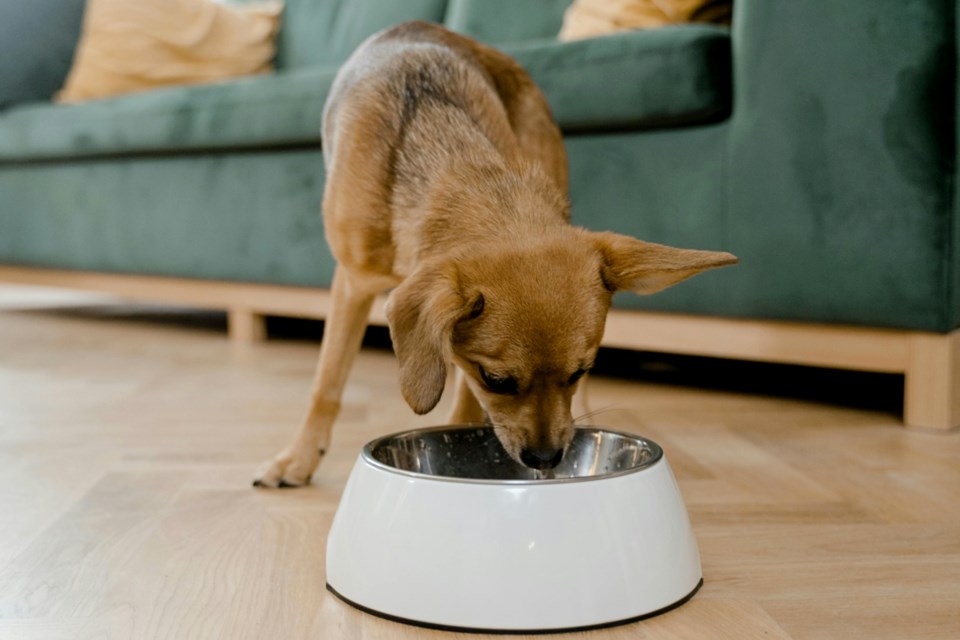In the exam room, food takes up a large portion of the consult. We talk a lot about energy requirements, calorie calculations for growth, maintaining a healthy weight in adult dogs, or more commonly getting back to healthy weight in overweight dogs and how those energy demands change as our pets age.
Nutrition is also a basis of conversation for management or treatment of chronic illnesses.
With the sheer volume of pets foods available — whether through pet food stores, online companies or through your veterinarian — it can be difficult to know which food is best. Reading ingredients is something I do when shopping for foods, but that can get confusing as well because terms have very specific definitions and what seems like ‘filler’ or ‘poor quality’ may surprise you.
I want to start by talking about grains. I have this conversation at least once a day. Grains are not bad. They are not ‘filler’. They provide starches for energy, as well as essential fatty acids, minerals, vitamins and fibre. All important for balanced nutrition for your dog.
Grain-free dog foods became popular in the late 2000s and their popularity has increased steadily since then. However, grain-related disorders or allergies are very rare in dogs, and there are no studies supporting the argument that feeding them grains is harmful to your dog.
In July 2018, the FDA issued an alert of increased reports of dilate cardiomyopathy (DCM) being diagnosed in dog breeds that had no previous genetic predisposition. DCM is weakening of the heart muscle, causing the chambers of the heart to enlarge.
This decreases the efficiency of the heart and can lead to congestive heart failure. DCM was largely considered a genetic disease. Since this first alert, there have been more than 1,000 dogs reported to the FDA with non-hereditary DCM, and likely more that went unreported. One commonality between these cases were the dogs were being fed grain-free diets.
We still don’t know the exact reason that dogs being fed grain-free diets developed DCM – this is still under investigation. We do know that in some dogs, switching to a grain-inclusive food could reverse some of the changes to the heart. Do all dogs that are on a grain-free diet develop DCM? No, they don’t. But is it worth the risk? I don’t think so.
Studies show that grains are beneficial and packed with nutrients, are easily digestible when properly cooked, and could potentially reduce the risk of life-threatening heart disease. Sounds pretty good to me.
Another common concern among pet owners when picking a dog food is to find one without byproducts. I understand the desire to want ‘chicken’ or a whole meat as the main ingredient and protein source in your dog’s food. It is tricky as there are specific definitions for those terms in the ingredient label.
When we see chicken or beef in the ingredient list, it is easy to assume this means the meat that we would purchase at the grocery store. However, it is more likely to be necks and backs or other parts of the animal that are rarely eaten by humans. Using cuts of muscle (i.e. breasts or thighs) would be far too expensive.
A byproduct is what is left over after the intended product is made. In the meat industry, the primary product is muscle meat. Byproducts would then be heart, liver and kidneys, for example. These are highly nutrient-dense organs, but they aren’t commonly used in the human food market. What is not included are beaks, feathers and hooves, as these are inedible and specifically excluded from pet food.
There are a lot of different dog foods out there and the choice is up to you as a pet owner. We all want what is best for your dog.
At a lecture this past year, the speaker said “the correct diet is the one that works for the pet.” Your veterinarian can discuss with you the right diet for your pet based on their species, breed, life stage and lifestyle.
Dr. Courtney Andrews is a veterinarian at Lockerby Animal Hospital, a graduate of the Royal School of Veterinary Studies and dog mom to Argyll and Einstein. Animals & Pets is made possible by our Community Leaders Program.



